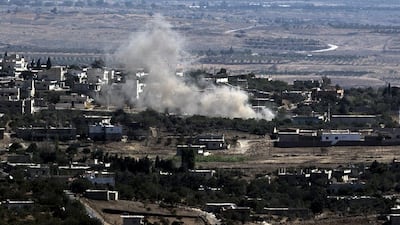MOSCOW // Russian president Vladimir Putin on Sunday called US support for rebels in Syria illegal and ineffective, and said American-trained rebels were defecting to join ISIL with arms supplied by Washington.
Ahead of his meeting with US president Barack Obama on Monday at the United Nations in New York, he said Syrian president Bashar Al Assad deserved international support for fighting terrorists.
British prime minister David Cameron yesterday conceded that Mr Al Assad could stay on as part of a transitional government but should not be part of Syria’s future in the long run.
Mr Putin also spoke to Saudi Arabia’s King Salman on Saturday about finding a solution to the Syrian crisis.
Meanwhile, Iranian president Hassan Rouhani said yesterday that he was ready to discuss a “plan of action” for Syria’s future after ISIL was defeated.
Iran, which along with Russia is allied to Mr Al Assad in the war, has until now been kept out of UN diplomatic efforts to find a political solution for the Syrian conflict.
“That is not a problem for us right now, to start holding discussions and dialogues so as to determine and reach the conclusion of the next plan of action after the terrorists are driven out that territory,” Mr Rouhani said.
“But we must all act in unison and have a formula that is required to drive out the terrorists, immediately.”
And Iraq yesterday announced it was increasing intelligence coordination with Russia, Syria and Iran to fight ISIL.
“It’s a committee coordinating between the four countries, with representatives of each country, in military intelligence and aimed at sharing and analysing information,” said Saad Al Hadithi, a spokesman for Iraqi prime minister Haider Al Abadi.
Mr Al Hadithi said the cell would focus on “monitoring the movements of terrorists and degrading their capacity”, but would not say whether it had already begun its work.
Iraq’s joint operations command said the deal with Russia came amid “growing concern over the presence of thousands of Russian terrorists engaged in criminal acts with ISIL”.
Russia has increased its military involvement in Syria this month, with US officials accusing Moscow of sending combat aircraft, tanks and other equipment to help the Syrian army.
The sudden military build-up in support of Mr Al Assad and a refugee crisis that has spilled into Europe have lent new urgency to resolving the Syria war.
The new US tack on Syria could bring together Russia, Saudi Arabia and countries such as Turkey and Qatar, which support Syrian opposition groups.
In Mr Putin’s conversation with King Salman, the men “exchanged views on regional security matters in the context of finding ways to settle the conflict in Syria”, the Kremlin said.
They also discussed “building more effective international cooperation in the fight against ISIL and other terrorist groups”, it said.
Saudi Arabia is part of a US-led coalition that began an air campaign against ISIL in Syria last September, and insists it will never cooperate with the Assad regime.
Mr Putin is expected to explain Russia’s motives in Syria when he addresses the UN General Assembly on Monday, just after Mr Obama takes the podium. Mr Rouhani is expected to follow.
The Russian president will be outlining his plan for Syria, which would include Mr Al Assad’s army in a larger anti-ISIL coalition – a proposal the US rejects.
Mr Putin will meet Mr Obama outside the UN meeting in their first formal talk in two years.
The US has a $500 million (Dh1.83 billion) programme to train and equip vetted moderates recruited from the rebels fighting Mr Al Assad, but it has faced repeated setbacks.
Mr Putin criticised Washington’s plans to train up to 5,400 Syrian rebels to fight the extremist group.
“It turns out that only 60 of these fighters have been properly trained, and as few as four or five people actually carry weapons,” he said. “The rest of them have deserted with the American weapons to join ISIL.”
Critics have urged Mr Obama to be more decisive in the Middle East and Syria, where the UN has said 250,000 people have died after four years of conflict. They say lack of a clear American policy has given ISIL opportunities to expand.
Mr Putin said Russia’s support for the Assad government was based on the UN Charter.
“We have been providing assistance to legitimate government entities only,” he said. “As of today it has taken the form of weapons supplies to the Syrian government, personnel training and humanitarian aid to the Syrian people.”
Last week, the Syrian army used Russian drones against ISIL for the first time.
Washington’s strategy in Iraq, built on an air campaign and sending several thousand military trainers and advisers, has also come under increasing fire for failing to reach the promised results.
Moscow has sold fighter jets and weaponry to Iraq but has taken the back seat as Iran and the US-led coalition often competed to be Baghdad’s top partner in the war against ISIL.
Western powers, who had categorically rejected a role for Mr Assad in any political solution to the conflict in Syria, have recently softened their stance.
* Reuters and Agence France-Presse

